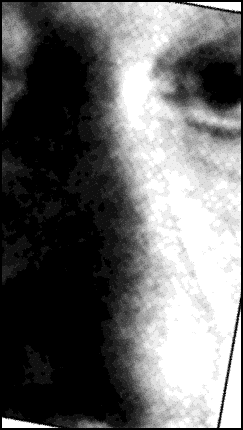Organ
And the Remarkable
Nature of Smell
Lyall Watson
(Norton)
 You think that some people stink more than others? You're probably right --- and if you are "European," you stink more than most:
You think that some people stink more than others? You're probably right --- and if you are "European," you stink more than most: Japanese of the 19th Century, when first exposed to European traders, described them as bata-kusai --- "stinks of butter." People of European or African ancestry do have the largest armpit or axillary organs, often so densely packed with glands that they look like sponges under the skin. People of Asian origin have smaller organs or no armpit glands at all. In Japan, 90 per cent of the population has no detectable underarm odor, and young men who are unfortunate enough to belong to the smelly minority can even be disqualified from military service on that ground alone.
Remember that old saw, "No-one knows what the nose knows." Well, according to Lyall Watson, it's all true. Your nose has strange and wonderful powers, mostly hidden in a place that rarely shows up in Gray's Anatomy. It's called "Jacobson's Organ," it lives just inside your proboscis, and --- in union with the "normal" smell sense --- it gives us a second dimension, a double sense of aroma. And it is primitive: Jacobson's Organ connects directly with the lower, reptilian brain.
Watson is a fun writer, and this book is filled with more than you would ever want to know about noses, sex, perfumes, plants, and stink. Trees and bushes --- even rice plants, if you will believe it --- communicate through smell (mostly ethylene, which "is commonly released by plants under stress.") Victorians had a "love seat" which allowed a couple to sit "close enough to talk to each other" and not touch, but, as he points out, it was a "pheromonal piece of furniture, putting a suitor's armpit within inches of his intended's nostrils."
The armpit is a veritable hive of stink glands. "They are closer to other human noses than the rest of our apocrine centres" --- apocrine being those parts of the body that make possible bacterial decomposition, which turns hormones into pheromones. In the armpit,
Apocrine glands are heaped up, two or three to a follicle, covering a patch the size of a tennis ball, coating the long underarm hairs with their oils, vaporizing easily in the warmth, dissolving and spreading with the help of sweat glands that keep the whole area moist and bacterially active.
 Schizophrenic patients have their own characteristic odor. German soldiers during WWI said they could sense the presence of the English across no man's land "by their smell." The English said the same about the Germans --- the word "Kraut" came from "the perception that they lived on, and smelled of, sauerkraut."
Schizophrenic patients have their own characteristic odor. German soldiers during WWI said they could sense the presence of the English across no man's land "by their smell." The English said the same about the Germans --- the word "Kraut" came from "the perception that they lived on, and smelled of, sauerkraut."
In the days of the Romans, adulterers were punished by having their noses amputated. The temperature of your mucosa rises by 1.5 degrees Centigrade immediately after intercourse, making us wonder about scientists hanging around congressional couples long enough to stick thermometers up their hot little noses. Wine-tasting is almost impossible for those who are having too much such hanky-panky: it's called "honeymoon rhinitis." Tiger urine --- sprayed backwards as a marker --- is so smelly that the Sanskrit name for tiger is vyagra, "the name derived from a verb root meaning to smell." As Watson points out,
This sheds an interesting new light on Pfizer's recent best-selling drug for impotent men, which is being marketed, with or without knowledge of Sanskrit, under the brand name of Viagra.
There are few nasal items that Watson misses. One such turned up in Marshall McLuhan's Understanding Media. "Until the coming of missionaries in the seventeenth century," he says,
the Chinese and Japanese measured time by graduations of incense. Not only the hours and days, but the seasons and zodiacal signs were simultaneously indicated by a succession of carefully ordered scents.
Like Watson, he says that the sense of smell is "the root of memory and the unifying basis of individuality." (His chapter on clocks is called "The Scent of Time.")
If you're into passages, nasal or otherwise, and if you're a devotee of aromatic minutes (as well as minutiæ), stick your neb into Jacobson's Organ. Any writer who can range from stink to etymology deserves our love. In his chapter on distasteful smells and symbiosis, he says that we react negatively to ants and wasps because of their characteristic aroma of piss:
It smells quite strongly of someone else's urine --- hence the wonderfully expressive old word for an open anthill, a pismire.
Proboscis, by-the-bye, comes from the Greek "Pro" --- before, and "boskein" --- to feed. As we used to say, when we were young and uncouth, You can pick your friends, you can pick your nose, but you can't pick your friend's nose.